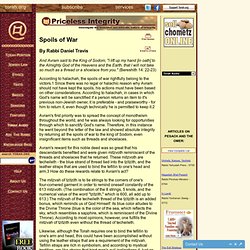

Daf Yomi: Reflections and Interrogations Inspired by Daily Talmud Study. Literary critic Adam Kirsch is reading a page of Talmud a day, along with Jews around the world.

Last Thursday, 90,000 people gathered at MetLife Stadium in New Jersey to celebrate the Siyum HaShas—the completion of the study of the Talmud. These Jews, and thousands more like them around the world, were reading the Talmud according to the schedule known as Daf Yomi, “a page a day,” a pace that allows the student to complete all 63 tractates of the Babylonian Talmud in about seven and a half years. Daf Yomi was created by a Polish rabbi in 1923; the cycle of reading that ended last week was the 12th. And the very next day, the 13th cycle began, with the first page of the first tractate, Berachot, or “Blessings.”
The Judaism Site. By Rabbi Daniel Travis And Avram said to the King of Sodom, "I lift up my hand [in oath] to the Almighty God of the Heavens and the Earth, that I will not take so much as a thread or a shoelace from you.

" (Bereshith 14: 22-23) According to halachah, the spoils of war rightfully belong to the victors.1 Since there was no legal or halachic reason why Avram should not have kept the spoils, his actions must have been based on other considerations. According to halachah, in cases in which God's name will be sanctified if a person returns an item to it's previous non-Jewish owner, it is preferable - and praiseworthy - for him to return it, even though technically he is permitted to keep it.2 Avram's first priority was to spread the concept of monotheism throughout the world, and he was always looking for opportunities through which to sanctify God's name.
Who Is A Jew? I.

Who is a Jew? To someone aware of Jewish communal goings-on in the 1970s and 80s, the question “Who is a Jew?” Raises issues that are more political than theological. Conversions. Beards, Sidelocks (Pe'ot), and Shaving. All agree that there is no ban on shaving with an electric razor, but for many, beards have become a powerful symbol of Jewish manhood.

Reprinted with permission from Louis Jacobs, The Jewish Religion: A Companion, published by Oxford University Press. The verse: "Ye shall not round the corners of your heads, neither shalt thou mar the corners of thy beard" (Leviticus 19:27) is understood by the talmudic rabbis not to mean that it is wrong for a man to be cleanshaven, but only that facial hair must not be removed with a razor. The standard code of Jewish law, the [16th-century work by Rabbi Yosef Karo,] Shulhan Arukh (Yoreh De'ah, 181:10) rules that it is permitted to remove all facial hair with scissors even when this is done as closely as if with a razor.
On the basis of this, many Orthodox Jews shave with an electric razor on the grounds that technically this machine, with its two blades, is not to be treated as a razor.
Shabbat. Bar/Bat Mitzvah. Kashrut. Menorah. Prayer. Death.